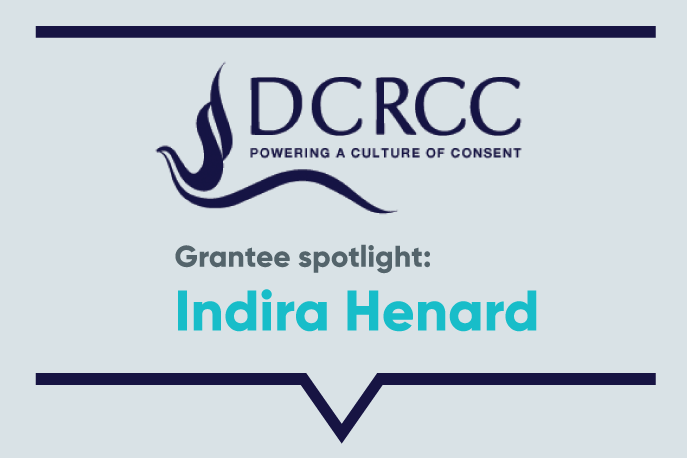In 2009, Indira Henard had a choice to make. She had been working for President-elect Barack Obama during his time in the Senate and could make her way to the White House, or she could follow another call to service at the DC Rape Crisis Center (DCRCC), where she’d found time to volunteer even during Obama’s hectic presidential campaign.
Flash forward to 2022: Henard has worked for DCRCC for the last fourteen years and has spent the last six as the organization’s executive director. “I loved my work in politics,” Henard told RALIANCE, “but it’s the honor of a lifetime to work with survivors. It’s not hard work, it’s heart work.”
RALIANCE is proud to count DCRCC among our grantees, which receive funding through our partnership with the National Football League. We sat down with Henard this week to discuss her work at DCRCC, particularly for Black communities.
RALIANCE: People may not always think about sexual violence prevention when they think about rape crisis centers. Can you share why prevention is central to DCRCC’s mission?
Henard: You can’t talk about sexual violence without first talking about sex and healthy relationships. DCRCC’s early focus was sex education – historically, we’ve had a strong relationship with DC’s public schools. We partner with schools to conduct workshops with students, teachers and parents about healthy sexual relationships, about the difference between safe and unsafe touch. We also provide crisis management and support in schools.
RALIANCE: How have you seen your work with schools evolve during the pandemic?
Henard: We’ve seen a significant increase in the number of students coming forward to report sexual violence over the last two years, which has made our work in schools more important than ever. The isolation of the pandemic and high-profile sexual violence cases in the news have no doubt kicked up students’ trauma. Over the last couple of months especially, we’ve had boots on the ground in schools to help them through crisis moments.
RALIANCE: In 2018, DCRCC received a grant supporting your efforts to prevent and respond to child sexual abuse in Black diasporic communities. Why was focusing on this specific community important?
Henard: Black diasporic communities are disproportionately impacted by child sexual abuse. Focusing on this community enabled us to facilitate healing and provide services that are culturally specific. In practice, that means taking a deep look at a community’s story, and data alone may not be sufficient for understanding the challenges facing communities of color. So, we don’t just look at numbers or recorded rates of assault – we take a wider view and try to think through the best way to understand what’s happening in a community. In some cases that means helping the community to tell its own story, whether in writing or orally, or gathering healing circles to help members of a community speak from their lived experienced. That’s all part of building services that have a direct response to racism and oppression.
RALIANCE: How have survivor support services improved for the Black community over time? What still needs progress or change?
Henard: One improvement is that we’ve seen an increasing number of Black professionals – myself included – providing support for survivors, and that has led to more spaces being specifically created for Black survivors. But there’s still more progress to make on that front. There needs to be a greater emphasis on ensuring that the staff and leadership at mainstream support services reflect the populations they serve. Ultimately, to better serve Black communities, we need to listen to survivors and involve them in creating the services they need. I’ve seen what’s possible when we put survivors at the center of our work.
RALIANCE: Back in 2020, you told us about some of the challenges facing rape crisis centers during the pandemic. Where do things stand now?
Henard: Rape crisis centers are adjusting to a new normal in which there’s high demand but insufficient funding to meet it. Naturally, rape crisis centers are still thinking about ways to provide services virtually, but the last two years have also changed the landscape in how we think about sexual violence. The pandemic, the #MeToo movement, and the recent reckoning about race in America have all come together to create an unprecedented demand for support from rape crisis centers. Many who were in isolation had trauma resurface or were newly vulnerable within their own homes. And we’ve also seen survivors who need a more holistic response – we can’t focus only on their sexual trauma and must account for struggles they’re facing with finances or housing, struggles that have been made more common by the pandemic’s economic impact.
RALIANCE provides consulting, assessment, and employee development services to help build more equitable workplace cultures and create environments free from sexual harassment, misconduct and abuse. We stand ready to support your organization’s goals – contact us today at info@raliance.org to get started.

